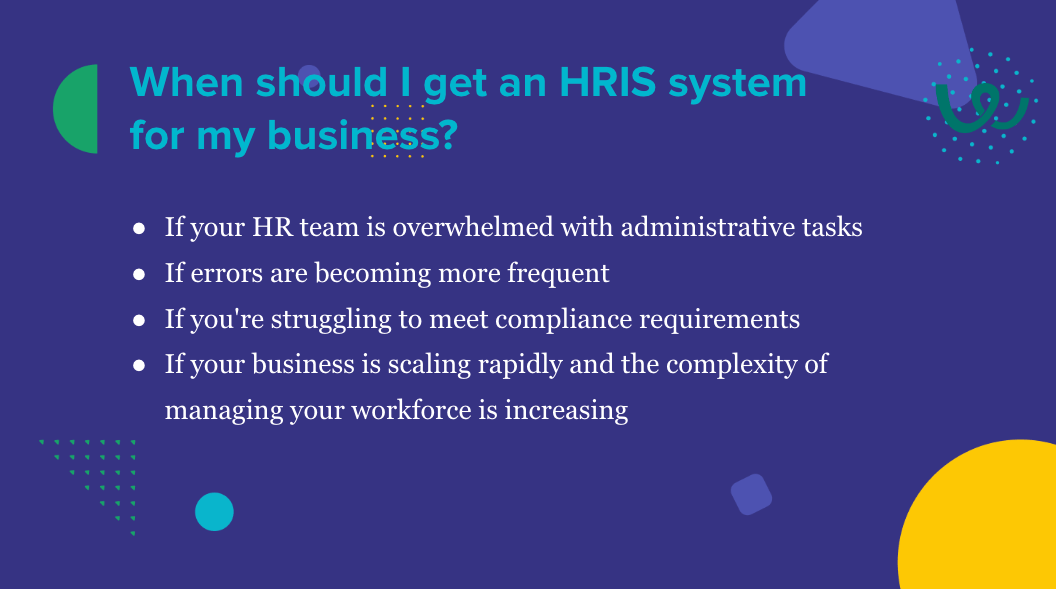Why a growing business needs an HRIS soon (and cheaply, too)
With the demands of managing diverse workforces, ensuring compliance, and driving organizational performance, the need for a robust, scalable HRIS has never been greater for the HR teams.

A Human Resource Information System (HRIS) is a tool that has become not just a luxury but a necessity for growing businesses as ink to a pen. This article isn’t just about what an HRIS can do, it’s about why your business needs an HRIS sooner and more cost-effectively than you might think.
Contents
What is an HRIS system?
At its core, an HRIS is a software solution designed to manage and automate many of the routine and administrative tasks associated with human resources.
But it’s more than just a digital assistant.
An HRIS encompasses a wide range of functionalities, including employee data management, payroll, recruitment, benefits administration, time and attendance, and much more.
It’s the central hub from which you can steer the ship of your HR department, ensuring that everything from onboarding to offboarding runs smoothly.
While HRIS focuses on information management, Human Resource Management Systems (HRMS) and Human Capital Management (HCM) might offer broader functionalities, including talent management and strategic HR planning.
Choosing the right system depends on your business’s specific needs and growth stage.
If you are completely new to this, consider first reading about what an HRIS is and how to determine if you need one.
When should I get an HRIS system for my business?
Determining the right time to invest in an HRIS can be daunting. However, certain indicators suggest it’s time to make the leap.
- If your HR team is overwhelmed with administrative tasks,
- if errors are becoming more frequent,
- if you’re struggling to meet compliance requirements,
- if your business is scaling rapidly and the complexity of managing your workforce is increasing
…then an HRIS can provide the necessary support to manage that growth effectively.

For growing businesses, early adoption of an HRIS can be particularly beneficial, especially when they surpass the number of 25 employees, which triggers compliance requirements.
For growing businesses, early adoption of an HRIS can be particularly beneficial, especially when they surpass the number of 25 employees, which triggers compliance requirements.
Implementing the system when the business is still manageable in size allows for smoother integration and adaptation, setting a solid foundation for future expansions.
Why do you need an HRIS sooner and cheaper?
The question isn’t just why your business needs an HRIS, but why it needs one sooner rather than later and at a cost that won’t break the bank.
The answer lies in the compound benefits that an HRIS brings over time. Early adoption of HRIS technology can lead to significant long-term savings and efficiencies.
Firstly, it reduces the labor hours spent on manual tasks, decreasing the likelihood of costly errors, such as those related to compliance or payroll.
Secondly, it allows for a more strategic allocation of HR’s time towards talent management and employee engagement, activities that directly contribute to your company’s culture and bottom line.
Furthermore, as your business grows, the cost and complexity of implementing an HRIS will only increase.
Early adoption means you can integrate the system into your processes gradually and at a smaller scale, making it more manageable and cost-effective.
Early adoption means you can integrate the system into your processes gradually and at a smaller scale, making it more manageable and cost-effective.
This proactive approach not only positions your business to manage current challenges more effectively but also equips it to handle future growth with agility and foresight.
What does the market think about the HRIS?
A small company spends about 10 weeks before choosing an HRIS, which reflects the importance they place on it. However, this factor needs to be eliminated.
Time is not a problem when you proactively act for your business and check your options. The good news is that the sooner you choose the sooner your implementation will start.
People in the market believe that using an HRIS will increase their functionality and this is true. Utilizing technology to:
- Onboard new hires
- Manage employee information
- Organize company documents
- View organization structure
- Manage time off
Can help you save a lot of time and increase productivity and efficiency quickly for your organization.
The future of HRIS technology is promising and is set to improve how businesses manage their human resources.
Emerging trends include the integration of artificial intelligence and machine learning to provide predictive analytics, further automating and enhancing decision-making processes.
We’re also seeing a shift towards more user-friendly, mobile-optimized systems that reflect the modern workforce’s needs.
As these technologies continue to evolve, they’ll offer even more sophisticated tools to manage, engage, and develop talent.
Don’t miss the opportunity to be part of it.
Frequently asked questions
- How does an HRIS enhance business operations?
- An HRIS automates and streamlines routine HR tasks, significantly reducing administrative burdens. It manages payroll, employee data, and benefits, decreasing errors and improving compliance. By freeing HR to focus on strategic initiatives like talent management, it enhances overall productivity and contributes to a positive company culture.
- When is the right time to implement an HRIS?
- Implement an HRIS when administrative tasks become overwhelming, errors increase, or during rapid business growth. Early adoption is beneficial, especially as you surpass critical employee numbers, ensuring scalable, manageable processes and compliance, making the system more cost-effective and less disruptive as your business grows.
- What are the financial benefits of adopting an HRIS early?
- Early HRIS adoption reduces labor costs and minimizes expensive errors in payroll and compliance. It facilitates cost-effective scaling by integrating the system gradually at a smaller scale, allowing for strategic HR time allocation toward talent management and improving the company's bottom line.
- How does an HRIS differ from HRMS and HCM systems?
- HRIS focuses on administrative human resource tasks, while HRMS and HCM provide broader functionalities, including talent and strategic HR planning. HRMS might include talent management modules, and HCM extends to strategic HR analytics, making them suitable for more extensive, strategic organizational needs.
- What future trends are shaping HRIS technology?
- Future HRIS technology trends include artificial intelligence and machine learning integration for predictive analytics, automating decision-making. A shift towards user-friendly, mobile-optimized systems reflects the modern workforce's needs. These advancements make HRIS not just operational tools but strategic assets for business success.




